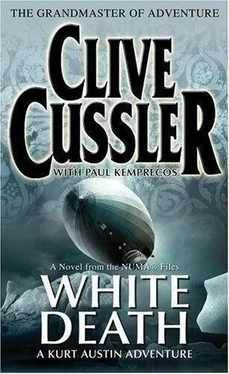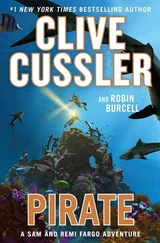'It was, and I do feel as if I've eaten all the pasta in Italy. But it's good to be back on my own turf."
"I wondered what you had turned up on my historical query." "I was going to call you later today. Fascinating material. Can you drop by? I'll brew up some coffee, and we can talk about my find- ings.
"Five minutes. I just happen to be driving through Georgetown." When Austin arrived, Perlmutter served two giant cups of cafe latte. He pushed aside a pile of books to reveal a chair for Austin, and another stack to make room for his own wide haunches on an over- sized sofa.
Perlmutter sipped his coffee. "Well, now, getting down to business… After you called me in Florence, I discussed your query about the Roland relics with my host, a Signor Nocci. He remembered a his- torical reference he had seen in a letter to the Medici Pope penned by a man named Martinez, who was a fanatical supporter of the Span- ish Inquisition, particularly where it applied to the Basques. Mr. Nocci put me in touch with an assistant curator at the Laurentian Li- brary. She dug out a manuscript written by Martinez in which he di- rects particular venom at Diego Aguirrez."
"The ancestor of Balthazar, the man I met. Good work." Perlmutter smiled. "That's only the start. Martinez says flatly that Aguirrez had the sword and the horn of Roland and that he would pursue him, and I quote, 'to the ends of the earth,' to retrieve these objects."
Austin let out a low whistle. "That establishes that the Roland relics were real and puts them directly in the hands of the Aguirrez family."
"It would seem to verify the rumors that Diego was in possession of the sword and horn."
Perlmutter passed over a folder. "This is a copy of a manuscript from the Venice State Archives. It was found at the naval museum in a file having to do with war galleys."
Austin read the title on the first page. "An Exoneration of a Man of the Sea." The publication date on the frontispiece was 1520. The preamble described the work as, An account by Richard Blackthorns an unwilling mercenary in the service of the Spanish Inquisition, a hum- ble sailor who has always stood in defence of His Majesty's name, in which he proves infamies that have been brought against him to be untrue and warns any and all never to trust the murdering Spaniards.
He glanced up at Perlmutter. "Blackthorne is surely a master of the never-ending sentence, but what does he have to do with Roland and the long-dead Aguirrez?"
"Everything, m'lad. frything." He looked into the bottom of his coffee cup. "While you're up, old boy, would you fetch me a re- fill? I'm feeling peaked after the rigors of travel. Get one for your- self."
Austin had no intention of getting up, but he rose from his chair and went for the refills. He knew that Perlmutter functioned best when he was eating or drinking.
Perlmutter sipped his coffee and ran his hand over the manuscript as if he were reading it with his fingers. "You can study this at your leisure, but I'll give you a quick summary now. Apparently, Black- thorne fell afoul of rumors that he had willingly served the hated Spaniard, and he wanted to set the record straight." "That came across loud and clear in the preamble." "Blackthorne was worried about the stain on his name. He was born of a respectable merchant family in Sussex. He went to sea as a youth and worked his way up from cabin boy to master of a merchant vessel plying the Mediterranean. He was captured by Barbary pi- rates and forced to become a rower on an Algerian galley. The gal- ley was shipwrecked, and he was rescued by the Genoese, who turned him over to the Spanish."
"Remind me never to be rescued by the Genoese." "Blackthorne was a hot potato. According to the Inquisition sys- tem, any Englishman was a heretic, and subject to torture, arrest and execution. English and Dutch sailors shunned Spanish ports for fear they would be arrested. If you were caught with a copy of the King James Bible or possessed some ancient classic deemed heretical, you were, to put it literally, toast."
Austin glanced down at the folder. "Either Blackthorne survived or his memoirs were ghostwritten."
"He had nine lives, our Captain Blackthorne. He actually escaped once from the Spanish but was recaptured. He was eventually dragged from his dark cell in irons to stand trial. The prosecutor called him an enemy of the faith and 'other opprobrious names,' as he put it. He was condemned to death and was headed for the stake, when fate intervened in the unlikely form ofEl Brasero."
"Isn't that the name of a Mexican restaurant in Falls Church?" "You're asking the wrong man. I've always considered 'Mexican' and 'restaurant' uttered in the same sentence as no less an oxymoron than 'military intelligence.' El Brasero means 'brazier' in Spanish. It was the nickname given the aforementioned Martinez for his zeal in putting the torch to heretics."
"Not the type you would invite to a barbecue."
"No, but he proved to be Blackthorne's savior. The Englishman impressed Martinez with his resourcefulness, and his ability to speak Spanish, but more important, Blackthorne was familiar with war galleys and sailing ships."
"That shows the lengths to which Martinez would go to catch
Aguirrez, even sparing a victim."
"Oh, yes. We know from his writings that he thought Aguirrez was especially dangerous because he had been charged with the steward- ship of the Roland relics and might use them to rally his countrymen against the Spaniards. When Aguirrez escaped arrest in his ship, Mar- tinez went after him. Blackthorne was commanding Brasero's lead galley when they caught up with Aguirrez on his caravel off the coast of France in 1515. Although he was becalmed, outnumbered and out- gunned, Aguirrez managed to sink two galleys and put Martinez to flight."
"The more I learn about Diego, the more I like him." Perlmutter nodded. "His strategy was brilliant. I intend to include this fight in a collection I'm preparing of classic sea battles. Unfor- tunately, Brasero had the services of an informer who knew that Aguirrez always stopped in the Faroe Islands to rest before crossing the ocean to North America."
Austin leaned forward in his chair and murmured, "Skaalshavn." "You know it?"
"I was in Skaalshavn a few days ago."
"Can't say I'm familiar with the place."
"Can't blame you, it's quite remote. A picturesque little fishing vil- lage with a natural harbor of refuge. There are some interesting caves nearby."
"Caves?" The blue eyes danced with excitement. "Quite an extensive network. I've seen them. From the drawings on the walls, I'd say they've been occupied off and on going back to ancient times. The Basques, or others, may have been using them for hundreds, maybe thousands, of years."
"Blackthorne mentions the caves in his narrative. In fact, they were instrumental in his story." "In what way?"
"Aguirrez could easily have outdistanced his pursuers and fled to North America, where Brasero would never find him. The Basques were the only mariners intrepid enough to sail the Atlantic in those days. But Diego knew that Brasero would go after his family. And he knew that even if he stashed the relics in North America, when he returned to Europe, Brasero would be waiting."
"Maybe he decided to take a stand for the most primal of reasons," Austin said. "He wanted his revenge on the man who had ruined his life and stolen his fortune."
"No disagreement there. Brasero was just as determined to finish the job he'd started. He had switched from his galley to a warship twice the size of Diego's caravel. He had put Blackthorne in com- mand. The ship bristled with guns that would have made short work of the Basques. But Diego knew from their previous encounter of the informant on board Brasero's ship and prudently moved the caravel away from the caves. Diego stationed a handful of his men on shore, where they could be seen by Brasero, and when Martinez launched his boats, the men ran into the caves, drawing their pursuers after them."
Читать дальше












